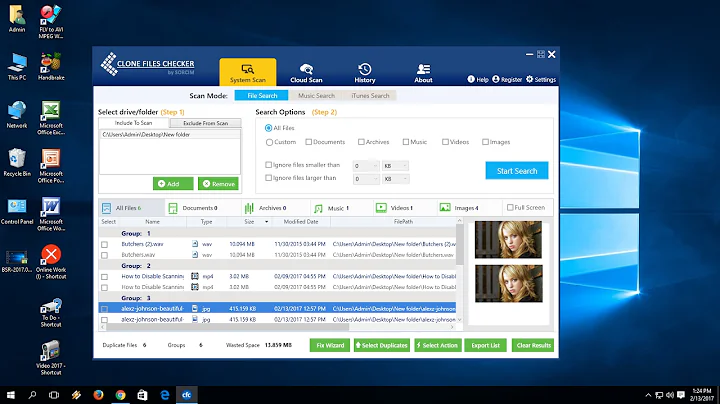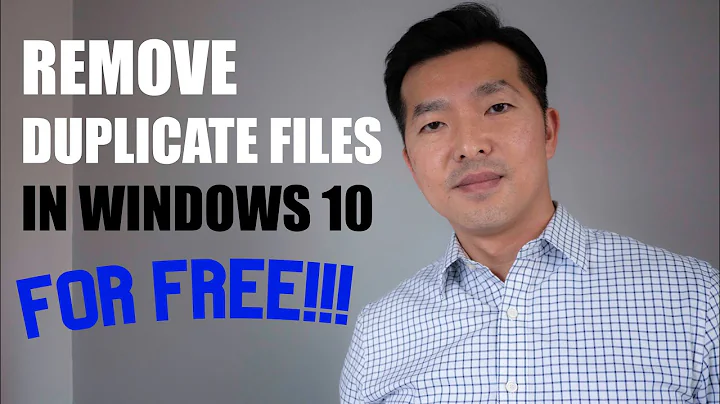Search and Delete duplicate files with different names
Solution 1
There is such a program, and it's called rdfind:
SYNOPSIS
rdfind [ options ] directory1 | file1 [ directory2 | file2 ] ...
DESCRIPTION
rdfind finds duplicate files across and/or within several directories.
It calculates checksum only if necessary. rdfind runs in O(Nlog(N))
time with N being the number of files.
If two (or more) equal files are found, the program decides which of
them is the original and the rest are considered duplicates. This is
done by ranking the files to each other and deciding which has the
highest rank. See section RANKING for details.
It can delete the duplicates, or replace them with symbolic or hard links.
Solution 2
Hmmph. I just developed a one-liner to list all duplicates, for a
question that turned out to be a duplicate of this. How meta. Well,
shame to waste it, so I'll post it, though rdfind sounds like a better
solution.
This at least has the advantage of being the "real" Unix way to do it ;)
find -name '*.mp3' -print0 | xargs -0 md5sum | sort | uniq -Dw 32
Breaking the pipeline down:
find -name '*.mp3' -print0 finds all mp3 files in the subtree starting
at the current directory, printing the names NUL-separated.
xargs -0 md5sum reads the NUL-separated list and computes a checksum
on each file.
You know what sort does.
uniq -Dw 32 compares the first 32 characters of the sorted lines and
prints only the ones that have the same hash.
So you end up with a list of all duplicates. You can then whittle that
down manually to the ones you want to delete, remove the hashes, and
pipe the list to rm.
Solution 3
I'm glad you got the job done with rdfind.
Next time you could also consider rmlint. It's extremely fast and offers a few different options to help determine which file is the original in each set of duplicates.
Solution 4
I'd be thinking of using Perl:
#!/usr/bin/perl
use strict;
use warnings;
use File::Find;
use Digest::SHA qw ( sha1_hex );
my %seen;
sub find_dupes {
next if -d;
local $/;
open( my $input, "<", $File::Find::name ) or warn $!;
my $sha1sum = sha1_hex(<$input>);
close($input);
if ( $seen{$sha1sum} ) {
print "$File::Find::name is probably a dupe of $seen{$sha1sum} - both have $sha1sum\n";
}
$seen{$sha1sum} = $File::Find::name;
}
find( \&find_dupes, "/path/to/search", "/another/path/to/search" );
Related videos on Youtube
Cestarian
Updated on September 18, 2022Comments
-
Cestarian almost 2 years
I have a large music collection stored on my hard drive; and browsing through it, I found that I have a lot of duplicate files in some album directories. Usually the duplicates exist alongside the original in the same directory.
Usually the format is filename.mp3 and duplicate file is filename 1.mp3. Sometimes there may be more than one duplicate file, and I have no idea if there are duplicate files across folders (for example duplicates of album directories).
Is there any way I can scan for these duplicate files (for example by comparing filesize, or comparing the entire files to check if they are identical), review the results, and then delete the duplicates? The ones that have a longer name, or the ones that have a more recent modified/created date would usually be the targets of deletion.
Is there a program out there that can do this on Linux?
-
 Admin about 9 years
Admin about 9 years -
 Admin about 9 years@VincentNivoliers Thanks, I guess that my question is a duplicate in the end, although I wasn't asking for a program specifically for music files (I just used music as an example) that question does have the answers I need to solve my specific problem.
Admin about 9 years@VincentNivoliers Thanks, I guess that my question is a duplicate in the end, although I wasn't asking for a program specifically for music files (I just used music as an example) that question does have the answers I need to solve my specific problem. -
 Admin about 9 yearsI would say that if your files are identical to the bits, with different names, then the question would hold, and I would suggest using a hash program combined with a hash table to propose duplicates. For music collections, this is probably not the case if the equivalent files come from different sources.
Admin about 9 yearsI would say that if your files are identical to the bits, with different names, then the question would hold, and I would suggest using a hash program combined with a hash table to propose duplicates. For music collections, this is probably not the case if the equivalent files come from different sources. -
 Admin about 9 yearsYes, this was what I meant, music files were just my example, but since my exact scenario does involve music files the other thread probably has a good solution for me already. Hash program sounds like it might be a good solution independent of filetypes, know any?
Admin about 9 yearsYes, this was what I meant, music files were just my example, but since my exact scenario does involve music files the other thread probably has a good solution for me already. Hash program sounds like it might be a good solution independent of filetypes, know any? -
 Admin about 9 yearsSee also Find duplicate files
Admin about 9 yearsSee also Find duplicate files
-
-
Cestarian about 9 yearsI'm trying this program out now.
-
Cestarian about 9 yearsThis worked pretty well, rdfind /mnt/stash/music told me a total of 1 GB could be cleared up, and created a results.txt file to list all the duplicates. rdfind -deleteduplicates true /mnt/stash/music then deleted 2104 duplicate files for me. Thanks! This program was very high performance, it took only a minute to initially scan through my 200+GB music folder and only a few seconds to delete the duplicate files on it's second run. It would have been nice if it would also delete empty folders though.
-
Cestarian about 9 yearsYeah, I did not like rdfind's approach to finding the originals, it's happened that files I would have considered the duplicate were not the ones deleted (i.e. the original was deleted) it doesn't really bother me though, but if I was OCD...
-
Cestarian over 8 yearsFor the record, this is what I was originally hoping to see as an answer :P A one liner without the need to download any extra software (not that I have anything against that, I just like being "clean") Then again rdfind has less legwork, manually sorting out and removing files with matching checksums is a bit of work, ideally it should be done automatically by say deleting all files with the same checksum save for the one with the shortest filename.
-
golimar over 6 yearsNice one-liner. One of the things that
rdfinddoes better is to check file sizes first in order to exclude unique files from the list -
 ashleedawg almost 4 yearsdidn't work for me (
ashleedawg almost 4 yearsdidn't work for me (command not found) but the other answer did





